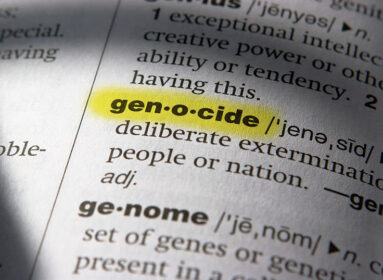
The beauty and brilliance of two victims of terror, as seen through their writings
By Cindy Mindell
On the morning of Feb. 25, 1996, a suicide bomber detonated an explosives-laced vest on the Number 18 bus in downtown Jerusalem. The blast killed nine IDF soldiers and 17 civilians, among them, fiances Matthew Eisenfeld, 25, of West Hartford and 23-year-old Sara Duker of Teaneck, N.J.
The bombing and its aftermath are chronicled in the 2014 book, The Bus on Jaffa Road: A Story of Middle East Terrorism and the Search for Justice, by journalist Mike Kelly.
Now comes a sequel of sorts — a showcase of the potential that was lost in the bombing of Bus 18.
 In Love Finer Than Wine: The Writings of Matthew Eisenfeld and Sara Duker, editor Rabbi Edward C. Bernstein of Temple Torat Emet in Boynton Beach, Fla., recalls the lives of two young Jewish idealists and leaders through their letters, journal entries, and academic papers.
In Love Finer Than Wine: The Writings of Matthew Eisenfeld and Sara Duker, editor Rabbi Edward C. Bernstein of Temple Torat Emet in Boynton Beach, Fla., recalls the lives of two young Jewish idealists and leaders through their letters, journal entries, and academic papers.
In his foreword to the book, Kelly recounts an interview he conducted in 2012 with the parents of the suicide bomber who killed Eisenfeld and Duker. When he asked the father whether people still talk about his son, he was told, “Things like that tend to fade into oblivion.” In contrast, Kelly writes, “Matt and Sara are not frozen in time. They still live.”
Love Finer Than Wine began as a tribute to Eisenfeld and Duker on the one-year anniversary of their deaths. Bernstein had met Eisenfeld when they were students at the Jewish Theological Seminary (JTS) and the two were studying together at the Schechter Institute in Jerusalem in 1996. Over the next year, as JTS planned an appropriate memorial, Bernstein collected the couple’s writings to include in a commemorative scrapbook. In February 1997, JTS dedicated the Matthew Eisenfeld and Sara Duker Beit Midrash, a 24-hour study hall and library. JTS put a copy of Bernstein’s scrapbook on display and gave copies to the Eisenfeld and Duker families.
The scrapbook proved an invaluable vehicle for Kelly to gain insight into Eisenfeld and Duker. Since compiling the collection, Bernstein had wanted to see the couple’s writings reach a wider audience. He found that opportunity as the couple’s 20th yahrzeit approached.
But the editing process wasn’t easy.
“Matt and Sara’s tragic deaths had a profound effect on me and I think about it every day,” Bernstein says. “It was a terrible, terrible trauma that affected me and everyone who knew them. Without a doubt, engaging in this project and working with their writings on an intimate level on a regular basis put me face to face with this trauma from 20 years ago. At the same time, it was very meaningful for me to have a role in restoring their voices, to make sure that, while they physically may be dead, their Torah is not dead; they can still teach us, even a generation after their passing.”
One of the selections included in the book is the last paper that Eisenfeld wrote for a course on “The Song of Songs,” using Bernstein’s computer. “Matt wrote it, printed it out, and submitted it to our professor on Thursday, Feb. 22, 1996,” Bernstein recalls. “I saw him that morning when he came over to my apartment and that was the last day I saw him. On Sunday, he and Sara left on their bus trip and they never made it.” The title of the book, Love Finer Than Wine, is taken from “The Song of Songs.”
The review process has also afforded Bernstein a wider historical perspective on the past two decades.
“When we were in Israel that year, there was a lot of ugliness; it was the same year that Rabin was assassinated, and yet, even with that, there still was genuine hope that peace could be achieved within a few years,” he says. “In his book, Mike Kelly correctly notes that the bombing was a major turning point. In terms of current events, Iran backed the suicide bombing and is now a subject of controversy in the American Jewish community as to the extent to which the U.S. government should have dealt with them in the current nuclear deal.”
There are other issues addressed by Eisenfeld and Duker that are still of concern today — in some cases, even more so. In addition to escalated violence and terrorism throughout the world, Jewish society is plagued by tensions between the different streams of Judaism, according to Bernstein.
In a letter to fellow environmentalists, Duker “encapsulates a longing for a more pluralistic Judaism based on her experience in Israel,” says Bernstein. “She talks about being at the Kotel, where she was ostracized for wanting to pray in a more egalitarian context. The Kotel is contemporary news: look what’s going on with Women of the Wall today.”
Over the course of the two compilation projects, Bernstein has received invaluable support from the Duker and Eisenfeld families.
“I am very grateful to them for entrusting me with the writings of their children and for helping this book come to reality,” he says. “They are incredibly courageous people and I am in awe of their strength.”
Bernstein hopes that Love Finer Than Wine will provide inspiration to a generation who has watched the world become increasingly violent.
“The opportunity presented to me to bring Matt and Sara’s writings to the general public is to show that victims of terrorism are not just statistics but they’re real people,” he says. “In the case of Matt and Sara, they were extraordinary people who, as young adults in their early 20s, had produced amazing works. They really believed that they would make a difference in this world and that they could make Judaism compelling for others and bring social justice into a more prominent role in the world. The collection in the book is a testimony to their brilliance, passion, sensitivity, and idealism.”
Love Finer Than Wine: The Writings of Matthew Eisenfeld and Sara Duker: lovefinerthanwine.com.
CAP: Rabbi Edward C. Bernstein








 Southern New England Jewish Ledger
Southern New England Jewish Ledger









